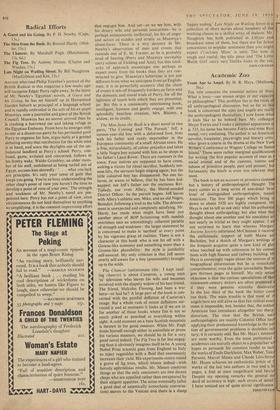Academic Zoo
From Ape to Angel. By H. R. Hays. (Methuen 36s.) THE title concerns the essential nature of Man What is basic—our simian origin or our capacit to philosophise? This problem lies at the roots o all anthropological discussion, but so far as thi book is concerned the apes and angels are reall the anthropologists themselves; I now know wha it feels like to be behind bars. My colleagu Meyer Fortes and I make a personal appearance a p. 335, his name has become Fortis and mine Ra mond; very confusing. The author is 'an America novelist, translator, playwright and literary critic who 'gives a course in the drama at the New Yor • Writers' Conference at Wagner College on State Island.' These seem rather marginal qualification for writing 'the first popular account of man as social animal and of the customs, totems and taboos of primitive people, past and present,' but fortunately the blurb is even less relevant that most.
The book is not an account of primitive custom but a history of anthropological thought. Th story comes as a long series of anecdotal 'brie lives' of distinguished anthropologists, mainl American. The first 300 pages which bring down to about 1920 are highly competent. M Hays is out to tell us not only what his authoriti thought about anthropology but also what the thought about one another and his anecdotes ar not nearly so trivial as they might appear. I a not surprised to learn that whereas Morgan Ancient Society infuriated McClennan it receiv the enthusiastic support of both Maine a Bachofen, but a sketch of Morgan's writings the Iroquois acquires quite a new kind of glo when touched up with references to his tonne tions with high finance and railway building. M Hays is annoyingly vague about the sources of h biographical information but he is remarkab comprehensive; even the quite unreadable Basti gets thirteen pages to himself. My only serio objection is that the curious speculations of the nineteenth-century writers are often presented if they were genuine scientific discoveri In the last third of the book the butter corn too thick. The main trouble is that most of t angels here are still alive so that fair critical asse ment is impossible, but, besides that, the author American bias introduces altogether too sharp distortion. The view that the British soci anthropologists are mainly Colonial Office hac • applying their professional knowledge to the sol tion of governmental problems is doubtless 'sal tary; it is certainly odd. But Mr. Hays's intentio are most worthy. Even the most puritanical academics can scarcely object to a populariser w hopes to persuade his common reader to tack the works of Emile Durkheim, Max Weber, Talc Parsons, Marcel Mauss and Claude Levi-Strati Mr. Hayes achieves an enthusiastic precis of t works of the last two authors in two and a h pages, a feat at once magnificent and farcic Despite my opening remarks the general sta dard of accuracy is high; such errors of detail I have noticed are of quite trivial significance.
EDMUND LEA.






































 Previous page
Previous page